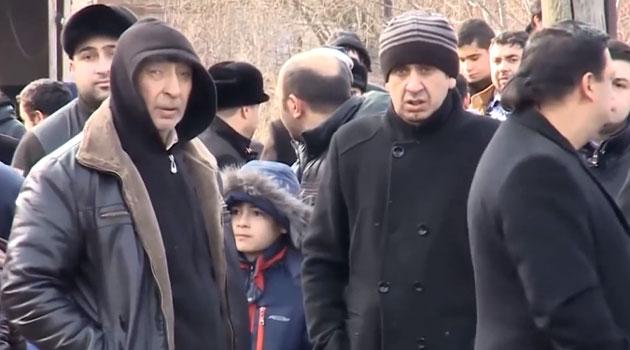In one of the biggest Romani settlements in Russia a mass battle took place several weeks ago between local residents and police. The cause was the efforts of gas technicians to cut the Romani residents off from a gas pipe they had illegally been tapping.
Ultimately a 500-member special unit of riot police was sent to the scene, which expelled the local Roma from their homes and made it possible for the technicians to cut off the connections. The situation in the settlement is far from resolved and there are tensions between the local Romani minority members and non-Romani Russians.
"We have nowhere to go!"
Last week Romani representatives from the suburban neighborhood of Plechanovo were supposed to come to the court in Tula to officially file requests to legally connect their homes to the gas main. None of them did so, however, in protest against the pressure they have been placed under by the authorities, whose response to recent requests has reportedly been to force the applicants them to "voluntarily" destroy their illegally-built homes in the settlement and move elsewhere.
"Where are we supposed to go? We have nowhere to go. This is a pogrom," local Romani residents have complained to the Russian press.
In the settlement, which is one of the biggest Romani communities in Russia, there is tension and uncertainty. Many Roma have already illegally reconnected to the gas main and some have also tapped into the electrical grid without authorization.
A new conflict is on the horizon and there is no solution in sight. Local authorities charge the Roma with failing to obey the law, with not responding to their instructions, and with refusing to integrate into society.
The Romani community’s response is that while they would like to live together with the authorities, their non-Romani neighbors and police without any conflicts, the authorities and police discriminate against them. They assert that all of the applications they have ever submitted have been rejected by the authorities.
The Roma are stuck, therefore, in a vicious cycle: Because their homes were built without permits, they cannot be officially connected to the electrical grid, the gas main, or the water distribution network. Whenever they file a request for their homes to be legalized, the only answer they receive is a court order for the structures to be immediately demolished.
Approximately 10 000 residents total live in Plechanovo. One-third of them are Romani.
Mayakovsky Street is the dividing line separating the Romani quarter from the rest of the suburb. On one side of the street the white majority lives, and on the other side the Roma have their mostly-illegal dwellings.
The street itself is just a hole on the ground, and piles of garbage litter its ditches. "Why don’t they take the garbage away from here? They don’t consider us human beings. They ignore us and then say there are problems with us," an elderly Romani woman who lives in Plechanovo told the local television station TeleTula.
"Do you think this was the first time they’ve cut them off from the gas?" a member of the ethnic Russian side of the street asks rhetorically in the same television report. "Of course it wasn’t. The gas technicians are here every month. [The Roma] always throw rocks at them and shout at them that they’re not going to pay," the ethnic Russian resident from the other side of the street angrily tells the cameras.
After the death of the "baron"
Tamara Giorgiyevna is the owner of a nice little villa with a white facade that even proudly sports a little tower. It is one of the few homes in the Romani settlement that was built in accordance with the law and is properly connected to all the utilities networks.
"Ten years ago we asked the authorities if we could all apply to legalize our properties, as is appropriate. The gas technicians agreed with our baron that it would take too long to lay pipe to each home and it wouldn’t be cost-effective. That’s why we did it this way," Giorgiyevna told reporters from newspapers in Moscow.
"It all worked without any problems: The gas was on, the baron came around and collected the money for it from the community and sent it to the gas company. Once the old baron died, these problems began. They came and told us we had connected to the gas illegally, of our own accord, and they threatened to fine us," she said.
Now what predominates in one of the biggest Romani settlements in Russia is fear and uncertainty. Rumors are spreading that the authorities want to expel all of the Roma and use bulldozers to raze the houses and other makeshift dwellings to the ground.
There are rumors that there will be pogroms and that the Romani residents will be transported to the steppes, far from where they now live. The Romani locals know very well that they will not be welcomed anywhere else.
The economic crisis caused by declining oil prices and international sanctions against Russia are leading to the strengthening of anti-Romani, xenophobic sentiments among the majority. Even though no more serious conflicts other than Plechanovo’s "Gas Rebellion" have happened between the majority society and the Roma yet, the Roma still experience antagonism from their non-Romani neighbors across the street every single day.
